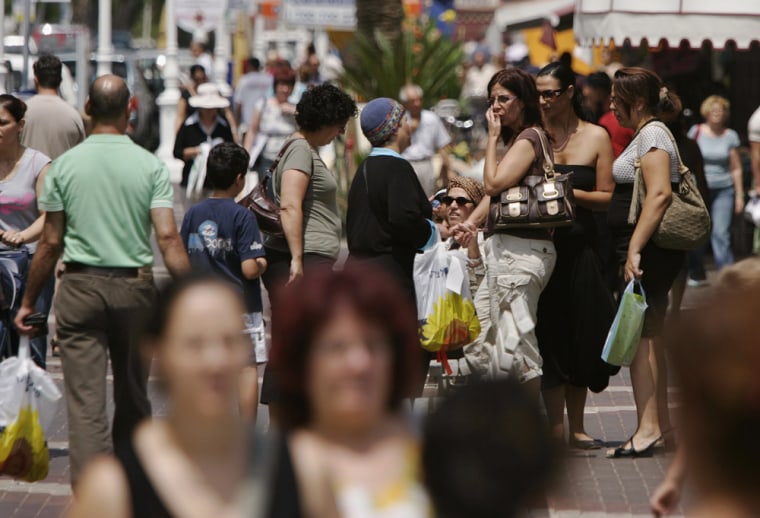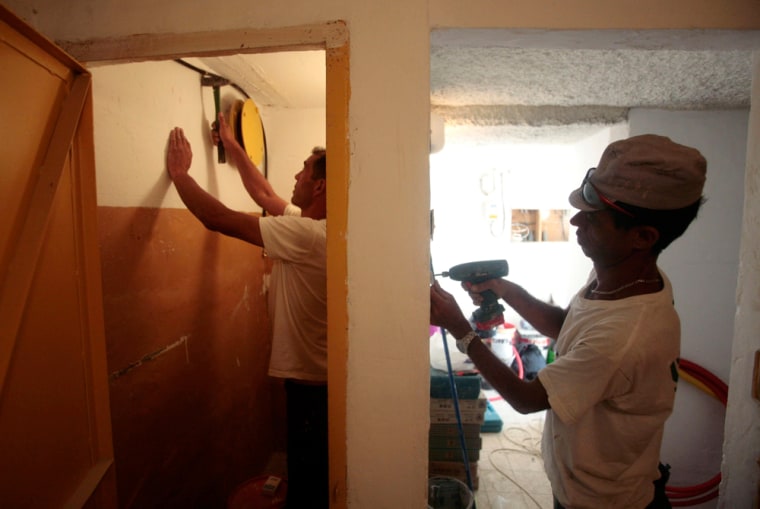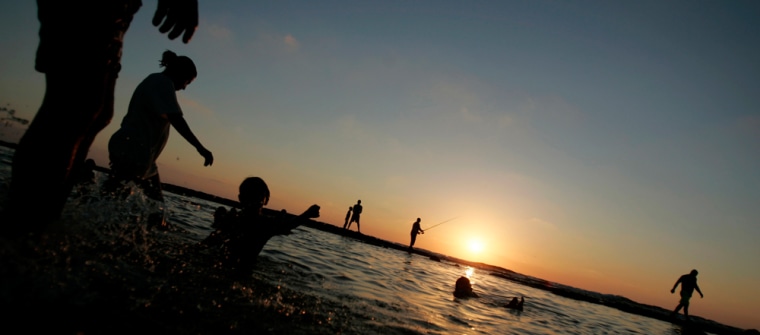In the year since Israel’s war with Hezbollah guerrillas began July 12, 2006, two contradictory currents have emerged: a grim mood of apprehension and disillusionment with the country’s leadership, alongside a booming economy unfazed by the fighting or concerns about Israel’s security.
That weave of pessimism and resilience is apparent in this town on the Mediterranean coast, where 50,000 Israelis live within view and easy rocket range of the Lebanon border, just five miles to the north.
No fewer than eight new cafes and restaurants have opened on Nahariya’s lively main street and beach promenade in the year since the war began on July 12, 2006. And even though Nahariya was one of the towns hit hardest by the Hezbollah barrages, property values remain where they were before the war.
But the businessmen who have invested in Nahariya still fear their town, like the whole country, is in grave danger and believe another war is a matter of time.
Last year’s war began when Hezbollah guerrillas crossed the Israel-Lebanon border and attacked an Israeli patrol, killing three soldiers and capturing two others.
Israel bombarded Lebanon from the air and then invaded, and Hezbollah launched nearly 4,000 rockets at Israeli population centers. In 34 days of fighting, 159 Israelis were killed, including 119 soldiers.
Israel’s military campaign caused heavy damage in Lebanon, shook the country’s fragile political system and killed more than 1,000 Lebanese, most of them civilians, according to tallies by human rights groups, the Lebanese government and The Associated Press.

But the army’s failure to crush Hezbollah, get the two soldiers back or stop the rain of rockets on Israel’s northern towns led most Israelis to conclude the war was a failure.
'A normal life'
Gabi Abutbul was in a back room last summer when a rocket destroyed the Nahariya fruit store he runs with his wife, Edna. He sprinted through the flames to safety.
Today, the only visible remnant of the explosion is a silver-colored clock melted by the heat of the blast, its hands frozen at the moment the rocket hit: 7:35.
Immediately after the war, Edna Abutbul said, she renewed the family’s passports so they could flee if fighting resumed. At the same time, they renovated the store and were back in business two weeks after the last rocket fell.
“People want to live a normal life,” Gabi Abutbul said. “If a war happens, it happens — I’m not going to think about it.”
There has been no decline in home sales in Nahariya, said real estate agent Avi Ben-Harosh. A centrally located three-bedroom apartment costs what it did a year ago — about $190,000, he said.
Ben-Harosh believes the market was helped by the fact that towns to the south were also hit by rockets.
“Everyone saw that in the next war nowhere will be safe,” he said. “Where are you supposed to go?”
Many questions unanswered
Not everyone in Nahariya has been able to move on. Miki Goldwasser’s son Ehud was one of the soldiers captured by Hezbollah, along with his comrade Eldad Regev. Both are believed to have been badly wounded, but Hezbollah has given no details on their conditions or proof they are alive. Secret negotiations for a prisoner swap have not yielded results.
The last year has seen a frantic campaign of bumper stickers, rallies and TV appearances by the soldiers’ families, who have also met with world leaders to lobby for their release.
“I’ve been occupied with fears and questions — what’s happening with Udi, where he is, how the people holding him are treating him, if he’s being given painkillers,” Goldwasser said, using her son’s nickname. “These questions won’t leave us alone.”
Nahariya’s conflicted mood reflects that of the country as a whole.
A preliminary government report in April found “severe failures” in Prime Minister Ehud Olmert’s handling of the war. Under intense criticism, the wartime defense minister and army chief have left their posts, and Olmert remains dismally unpopular. The report’s final conclusions, expected next month, are likely to increase pressure on Olmert to step down.
“The Israeli public has a feeling that there is no leadership, no vision, no feeling of responsibility among our leaders,” said Uzi Dayan, a former deputy army chief.
Good results?
But some Israelis see a brighter picture. Uri Dromi, a retired air force colonel and a scholar at the Israel Democracy Institute, noted the war damaged Hezbollah, brought a beefed-up U.N. peacekeeping force into Lebanon and spurred moderate Arab states like Saudi Arabia, Egypt and Jordan into a more active role in Mideast peacemaking.
“I think that in terms of what’s happened in the region and in Lebanon, the war’s results were good,” he said.
If Israel’s economic performance over the past year is any indication, investors agree.

The economy briefly slumped, then bounced back and grew at an annual rate of 7.3 percent in the last quarter of the year, according to the Israeli Central Bureau of Statistics. In the year since the war, the Tel Aviv Stock Exchange’s benchmark TA-25 index has risen 38 percent.
'To hell with them'
Gil Bufman, chief economist at Bank Leumi, attributed that to the strong world economy and foreign interest in Israel’s thriving high-tech sector. But the reason also lies in a long-standing Israeli unwillingness to allow tragedy to interfere with life, he said.
“Israelis don’t rest for a moment. They’re always looking for the next deal, and they don’t sink into a coma,” Bufman said.
A year ago, a rocket fell in an alley next to Amir Bokovza’s cafe in Nahariya, seriously wounding one of his workers.
Even though Bokovza said he was “certain” there would be another war, he renovated and expanded his cafe anyway. Today, the rocket’s crater is directly underneath a refrigerator stocked with Bacardi Breezers.
“To hell with them,” he said, gesturing toward Lebanon.
